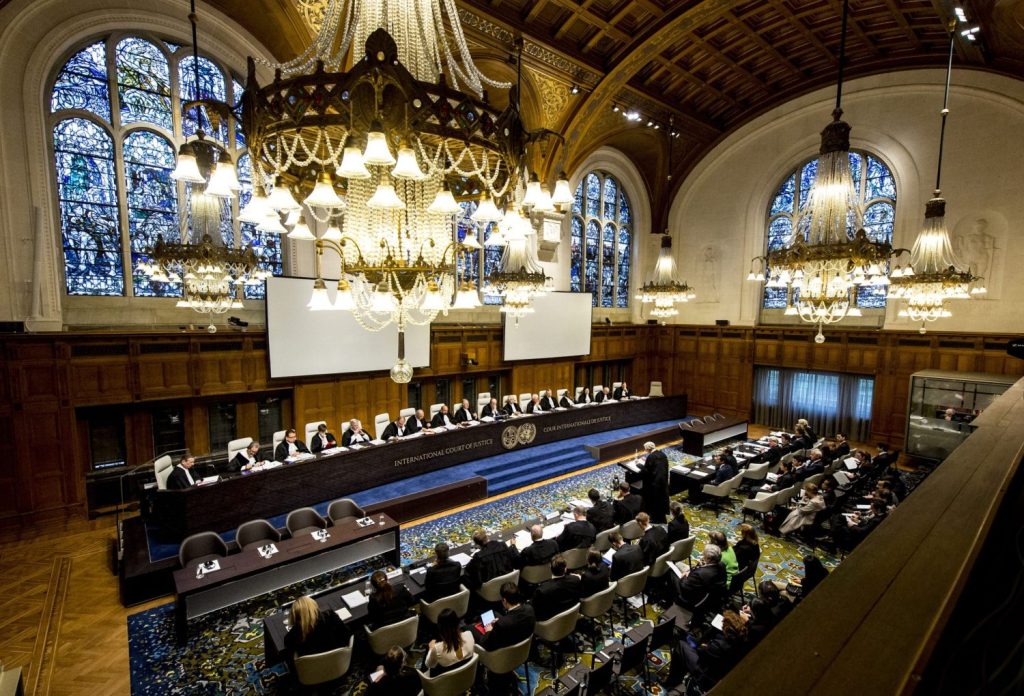FRESH AIR
Three reasons Australia should help protect the International Court of Justice
July 24, 2023 | Greg Rose

Australia did the right thing in late December and voted against a very problematic and controversial resolution of the UN General Assembly (UNGA) in New York.
The UNGA resolution in question requested an international legal ruling on sanctions to be imposed on Israel by UN Member States. The request went to the International Court of Justice (“ICJ”) in The Hague.
The resolution was not supported by most UN member states. It was adopted with only 87 votes in favour, despite 106 member states voting against, abstaining or absent in the vote on 30 December 2022.
The ICJ has now asked UN Member States to make submissions to it on this matter. The Organization for Islamic Cooperation (OIC), which has 56 UN Member States, has indicated its member States will make submissions for the Court demanding action against the Jewish State. It advertised a 20-page submission template and teams of dozens of lawyers to help member states make submissions.
There are three good reasons for Australia to make an urgent contrary submission to the ICJ.
First, the ICJ is requested to deal with the whole of the Palestinian-Israeli dispute in an advisory procedure in which one of the two parties will be absent. Israel will not be endorsing the misuse of the advisory procedure against it by participating in it. The Court Registrar is not equipped to investigate complex disputed factual issues and has no investigators. It will not have the ability to objectively and independently evaluate the distorted versions of the facts that it will be presented with.
Furthermore, the UN General Assembly resolution formulated the premises of the requested ruling, based on factual allegations that are simply untrue. For example, it misleadingly asserts Israeli “annexation” of the West Bank, although the only territory Israel has annexed is East Jerusalem. The UNGA request also alleges grave breaches of Palestinian human rights but calls for the court to rely for factual information upon untested reports by the UN Works and Relief Agency for Palestinians (the only UN agency which exists to serve only one people) and other UN bodies politicised similarly to the UNGA. Relying on this material as the basis for a ruling would effectively subordinate the ICJ to these UN agencies.
Second, the UN General Assembly’s request undermines the central legal framework for peace negotiations to resolve the Israeli-Palestinian conflict. This is a framework that was adopted by both the Palestinian and Israeli leaderships – the Oslo Accords. Moreover, although the UNGA itself endorsed those accords – yet it does not mention them in its request to the ICJ. An ICJ ruling that diminishes or sidelines the Oslo Accords would only deepen political divisions, entrench partisanship in the UN and render the conflict more violent and intractable.
The 1993 Oslo Accords specify that key issues are subject to negotiation between the two parties, and until a final agreement is reached, Israel is to maintain a military government in the West Bank. The Oslo Accords also specify that Palestinian self-determination would in part be the product of “direct, free and general political elections” – yet Palestinian Authority President Mahmoud Abbas is in the 18th year of his four-year presidential term, and denounced peace negotiations with Israel a dozen years ago. The UNGA might have done better to urge that the Palestinians simply hold elections and return to the negotiating table to discuss peace.
Thirdly, judges are mandated to decide law, not politics. The ICJ was never designed to force judicial procedures on UN Members States in a dispute without their consent. The UNGA request is a Kafkaesque legal strategy designed to promote the interests of one side in armed conflict by manipulating the ICJ Statute, subverting the key principle in that Statute – which is national consent to ICJ dispute resolution. To issue a legal ruling advising the General Assembly in an international dispute based on merely presumed facts presented by other UN political institutions would undermine the fundamental principle of sovereign consent, central to the whole concept of the ICJ.
It follows that the gravest harm of the ICJ delivering the legal ruling requested by the UNGA would be the encouragement of further abuse of international law. It would undermine the principle of honouring legal agreements, compromise the Court’s judicial function, erode truth-seeking and interpretation of law in accordance with its intended proper purposes, and obstruct peaceful settlement of disputes. In the long term, this would significantly undermine respect for international law and the integrity of international legal institutions.
Countries that truly value the UN system will make submissions to the UN Court urging it not to give the politicised legal advice demanded in the UNGA resolution. Australian Foreign Minister Penny Wong can exercise self-interested good sense by making a submission focussed on protecting the principles of the UN Charter and the apolitical legal role of the ICJ. Australia even has a judge on the bench of the Court, Prof Hilary Charlesworth, who could consider any such submission, and might urge the resumption of the Oslo legal obligations and peace negotiations.
Will Australia step up in time to make a submission supporting its December vote against the UN Court becoming a “lawfare” puppet that dances to the tune piped by the politicised UN General Assembly? Australia has very little time to act if it is going to try to protect the International Court of Justice from a calamitous decline, pushed by a resolution that our government rightly opposed in December.
Gregory Rose is Professor of Law at the University of Wollongong, and Director of Research at The Hague Initiative for International Cooperation.
RELATED ARTICLES

US Middle East strategy amid regional instability: Dana Stroul at the Sydney Institute

Antisemitism in Australia after the Bondi Massacre: Arsen Ostrovsky at the Sydney Institute





















